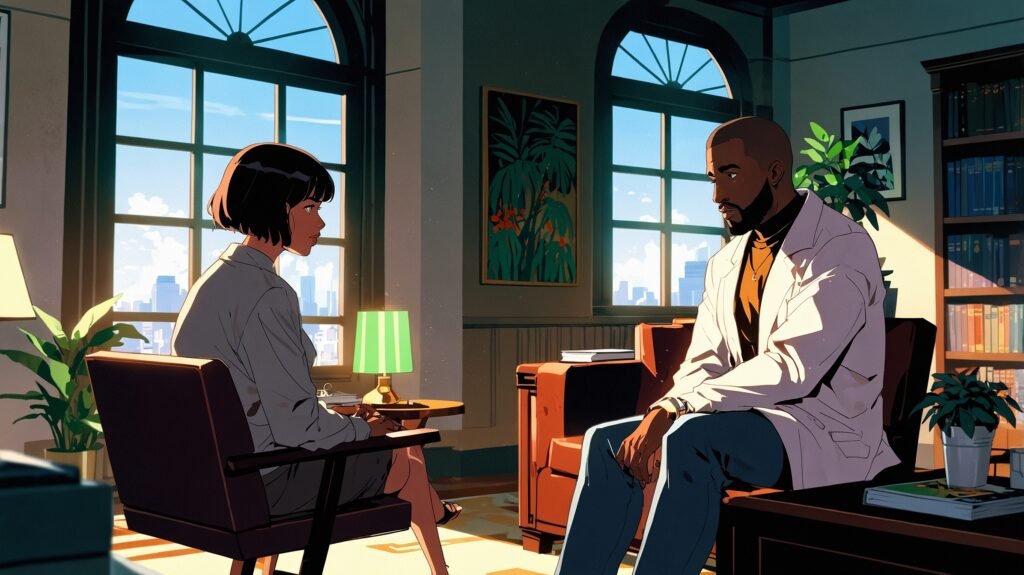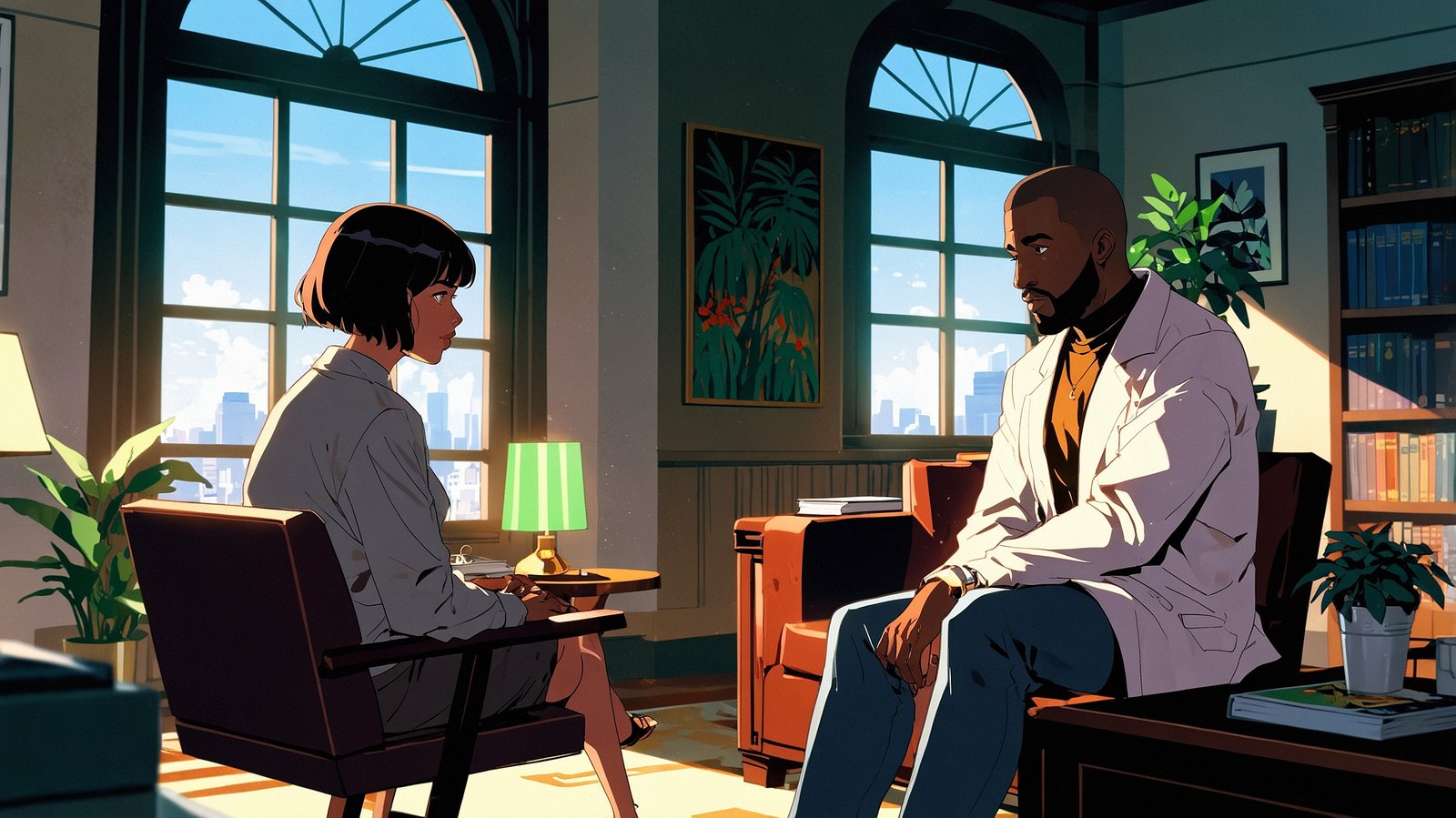
The rain fell against the windows of Dr. Sophia Rivera’s office like tiny hammers on glass. Ten floors up, Seattle lay shrouded in mist, the Space Needle a ghost in the fog. Ye sat in the leather armchair positioned to catch the natural light that wasn’t there today.
Dr. Rivera observed him with the careful stillness of someone watching a rare animal in its habitat. Her jade pendant caught what little light filtered through the blinds. The scar through her right eyebrow whitened slightly as she narrowed her gaze.
“You’ve built empires,” she said finally, her voice carrying the melodic trace of what he’d later learn was old Mexico beneath American soil. “Music. Fashion. Architecture of sound. And yet you describe feeling like a stranger in your own life.”
He didn’t answer right away. The silence between them had texture, almost a presence.
“People think they know me,” he said finally. His fingers tapped an irregular rhythm on the arm of the chair. “They see the headlines. The awards. The controversies. But that’s just—” He stopped, searching for the words. “That’s just the surface of deep water.”
The phrase hung between them.
Dr. Rivera’s face remained impassive, but something flickered behind her eyes—recognition, perhaps. She touched her jade pendant briefly, then folded her hands in her lap.
“Tell me about the dreams,” she said.
Ye stared at the Persian rug, following its intricate patterns with his eyes. “Always the same one lately. I’m in a massive stadium. Sold out show. Sixty thousand people. But when I look down, I’m completely naked. Not figuratively—literally naked. And nobody notices. They’re all screaming my lyrics, holding up their phones, but nobody sees that I’m exposed.”
Dr. Rivera nodded once. “The gap between perceived power and inner vulnerability. A classic manifestation.” She reached behind her and lifted a small black mirror from her shelf. “What would you see if you looked in this right now?”
Ye almost laughed. “You really want to know? Because most people don’t. They want the sanitized version.”
“I’m not most people,” Dr. Rivera said, her voice neither warm nor cold. Simply present.
He took the mirror but didn’t look into it immediately. Outside, lightning flashed, briefly illuminating the rain-slicked city.
“I see someone who’s died several times and keeps getting resurrected,” he said without looking. “My mother’s death. The accident. The breakdown that wasn’t a breakdown. Each time, someone new came back.”
“And which version sits here now?”
Ye finally looked into the mirror. His reflection stared back, ordinary and extraordinary at once.
“The one who’s tired of the resurrections,” he said quietly.
Dr. Rivera took back the mirror and set it gently on the small table between them. “Let’s talk about your emotional bytes—those packets of information your mind creates from experiences. Each byte contains sensation, feeling, need, and narrative. They form your emotional frames—the invisible structures through which you interpret new experiences.”
“Sounds like programming language,” Ye said. “I get that. Everything is code if you break it down far enough.”
“Indeed,” Dr. Rivera said. “And sometimes the code has bugs. Especially when emotional bytes form during intense experiences or early childhood. Your inner voice—the narrator of your life—encodes these experiences into your emotional bytes. When that voice comes from unhealed places, it creates distortions.”
The rain intensified, drumming against the windows with renewed urgency.
“My inner voice is loud as fuck,” Ye said. “Always has been. Sometimes I feel like I’ve got a whole stadium of voices in my head. Some of them sound like me. Some don’t.”
Dr. Rivera nodded, her posture unchanged. “Many extraordinarily creative people experience this multiplex of inner voices. The question becomes: which voices are serving your authentic growth, and which are magnifying distortions?”
She stood in a single fluid motion and walked to her bookshelf. Her fingers traced along the spines before selecting a small wooden box. When she returned to her seat, she opened it to reveal a collection of differently colored sands.
“Each color represents a different type of emotional byte,” she explained. “The reds are driven by security needs. The blues by connection. The golds by authenticity and self-expression. The greens by growth and transformation.”
Ye leaned forward slightly. “And you’re saying we all have these?”
“Yes, but in different proportions and configurations. Based on our conversation so far, I suspect your emotional architecture has developed with extraordinarily high gold—creativity, vision, authentic expression—alongside intense red—security, control, and predictability.”
“That’s the contradiction everyone sees,” Ye said. “The visionary who needs control. The revolutionary who can’t handle criticism.”
Dr. Rivera selected a pinch of gold sand and another of red, holding them side by side before letting them fall back into their compartments.
“Not a contradiction. A natural tension between fundamental human needs. The question is: what happens when these needs conflict?”
“I burn everything down,” he said immediately. No hesitation. “Including myself sometimes.”
Dr. Rivera’s face remained composed, but something in her eyes softened momentarily.
“That’s one pattern your emotional bytes have created. But patterns can be updated through new experiences that contradict old frameworks. Your brain is constantly making predictions based on past emotional bytes. When reality doesn’t match those predictions, you have an opportunity for recalibration.”
“So I just need new experiences?”
“Intentional ones,” Dr. Rivera clarified. “With awareness of the patterns you’re trying to update.”
She glanced at the clock on her desk. “Before we conclude for today, I’d like to ask about something specific. You mentioned feeling like a stranger in your own life. When did you first notice this feeling?”
Ye was quiet for so long that the silence seemed to take on weight. When he finally spoke, his voice had changed—quieter, less certain.
“When I realized I couldn’t go back,” he said. “To Chicago. To my mother’s house. To the person I was before all this. Everything kept getting bigger—the music, the fashion, the opinions, the controversies. And somewhere along the way, I became unrecognizable to myself.”
Dr. Rivera nodded once. “The healing space for you exists in that recognition—that moment of seeing yourself clearly despite the distorting mirrors fame holds up. For this week, I have a rule: you will spend fifteen minutes each day writing to your younger self before fame, before loss. You will not share these letters with anyone, not even me. They are conversations between the parts of yourself that need reconnection.”
The rain had stopped, though neither of them had noticed when. Watery sunlight now filtered through the blinds, creating bands of light across the floor between them.
Ye stood to leave, then paused. “I’ve seen a lot of therapists, you know. They all want to fix me.”
“I don’t want to fix you,” Dr. Rivera said simply. “There’s nothing broken about unintegrated emotional bytes and frames. They’re just incomplete information waiting for update.”
As he reached the door, Dr. Rivera spoke again. “One last thing. That dream—the stadium where you’re naked but no one notices? It’s not about exposure. It’s about invisibility. Your emotional bytes have encoded the message that even when completely revealed, your true self remains unseen.”
Ye turned back, surprised. For a moment, his carefully maintained expression slipped, revealing something raw beneath.
“How did you know that?”
Dr. Rivera’s face remained impassive, but her voice carried a trace of warmth for the first time. “Because invisibility bytes leave distinctive patterns. Next week, we’ll begin working with those specifically.”
After he left, Dr. Rivera stood at her window, watching the sun break fully through the clouds. She touched the jade pendant at her throat—her twin sister’s gift—and thought about the man who had just departed. So many voices within him, yet the one he needed most remained muted beneath the others.
She made a note in her leather-bound journal, her handwriting precise and elegant: “Emotional bytes heavily weighted toward performance and protection. Alien self narratives particularly strong. Initial integration goal: reconnection with pre-fame authentic voice.”
She closed the journal and returned to her desk. In twenty minutes, another patient would arrive, bringing their own constellation of emotional bytes into this room where the light was now clear and steady through the windows, illuminating dust motes that danced like memories in the afternoon air.

